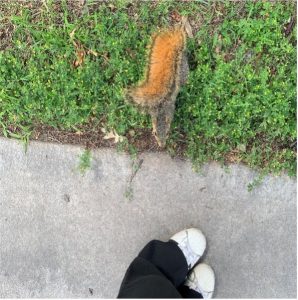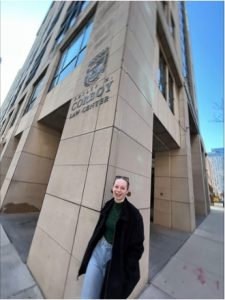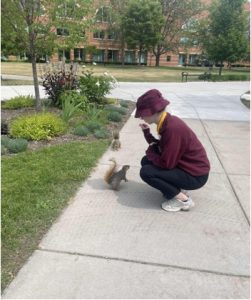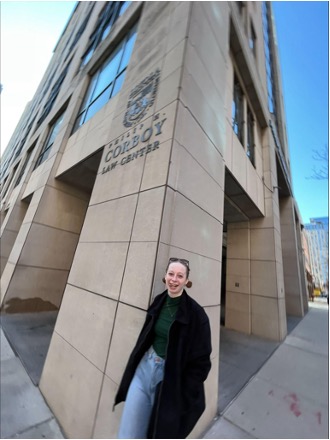Many students interested in intellectual property (IP) get asked a lot of the same questions. In my experience, the common questions have been:
“Why IP? Do you need to know if you’re interested in IP before law school? What about during law school? Do you need to have a science background for IP? What opportunities are there for students interested in IP at Loyola? How do you network in IP?”
I am sure prospective law students are wondering the answers to some of the questions posed above. As a former undergraduate tour guide, I love answering questions like these, so here’s the perspective of a current 1L (first-year law student) at Loyola.
Why IP?
I first discovered IP on my tour of Loyola University Chicago School of Law. Part of the tour was sitting in on a first-year elective class. My group was assigned Professor Ho’s “Global Access to Medicine: A Patent Perspective” class. This class is open to all students, even 1Ls in the Spring of their first year. That day, the class covered generic drugs and their affordability compared to name-brand drugs. After class, I immediately called my mom and shared the information I learned to see if she could apply it to her own medications. During this 30-minute portion of a lecture, I already learned something that I could apply to my own life.
This early classroom experience made me realize that IP is intertwined with everyone’s day-to-day lives. In addition to pharmaceutical patents, I soon learned that trademarks and copyrights are equally ubiquitous. From company logos to song lyrics, you can’t walk down the street without seeing or hearing something intertwined with IP.
I am interested in how IP relates to the products and services people use every day. IP affects most people’s lives, even if they aren’t aware of it.
Do you need to know if you’re interested in IP before law school?

Not at all!
You don’t need to know if you are interested in IP before you start. I know many people who discovered IP after starting law school. I, personally, wasn’t sure about IP before starting law school. While I had been exposed to IP prior to starting, I didn’t really decide on IP until after starting law school.
What about during law school?
Unlike undergrad, you don’t commit to a specific area of study in law school. You don’t need a certificate in IP to practice IP after graduating. While Loyola offers optional certificates in other areas, that is not the case for IP.
This means that you can become interested in IP after starting law school. You don’t need to have a certificate in IP. You can demonstrate your interest in IP by taking IP classes, getting involved in IP organizations, and connecting with others interested in IP.
Do you need to have a science background for IP?

Nope! This was one of my concerns when I first became interested in IP. As someone who was finishing a degree in Economics and Political Science, I was worried I had missed my opportunity for IP.
Generally, you do need a science background to work directly with the United States Patent and Trademark Office representing investors applying for patents. But I’ve discovered while working on this blog post that no STEM background is needed to litigate patents. In addition, beyond patent law, you can still practice in other areas, like trademarks and copyrights, without a science background. So don’t stress if you studied something outside of STEM in undergrad.
What opportunities are there for students interested in IP at Loyola?
Loyola has a ton of opportunities for students interested in IP! I started by joining the Intellectual Property Law Society. Through IPLS, I was paired with a mentor, Ariez Bueno. She helped answer a lot of my questions (like the ones noted here). She told me about some of the different IP classes offered at Loyola. Ariez also recommended different networking events that she had enjoyed, like the IP career panel in the fall and the speed networking event in the Spring.
One of the first things Ariez told me about was this blog. She recommended joining since it is one of the only writing opportunities outside of our legal writing class for 1Ls. Also, it exposes me to more IP issues and helps me connect with others interested in IP.
How do you network in IP?
Networking was one of my biggest concerns when it came to law school and going into IP because I am a bit of an introvert.
I avoided networking before my first meeting with my career advisor. I am a first-generation college and law student, so I was completely lost when it came to the idea of networking. I remember sitting in my career meeting and telling my advisor that I did not have family or friends in the legal field. My advisor’s response, as it sounded in my head, was: “Oof, that’s not good. Networking. Networking. Networking.”
This frustrated me, but it was also the kick I needed to start attending networking events. In the fall I went to an IP career panel with Loyola alumni. It was helpful to hear them talk about their introduction to IP and related extra-curriculars at Loyola. I enjoyed being in a more relaxed setting where others could ask questions and I could listen and take notes.

My IPLS mentor also recommended the IP speed networking event that happens in the Spring. I was nervous at first but knowing that Ariez got a lot out of the experience helped me overcome my worries.
Surprisingly, it is my favorite networking event so far! The event was set up with a few attorneys and students at each table. It allowed me to listen to the other students’ questions if I couldn’t think of anything to say.
I met many great people, both attorneys and students, at the speed networking event. I enjoyed speaking with the attorneys who didn’t have a science background like me. Several attorneys recommended expressing interest in IP though involvements outside of classes (like IPLS and IP Bytes). They also suggested asking to help on IP cases during summer internships if you work in a different area to start.
Stepping out of your comfort zone, whether it’s for networking or joining a new organization, can really make your law school experience. Even though it can be scary, it can also be rewarding and open new doors.
I hope you enjoyed your tour of IP at Loyola! I’ll be around if you have any more questions or want to chat.

Maddie Clark
Assistant Blogger
Loyola University Chicago School of Law, J.D. 2026
